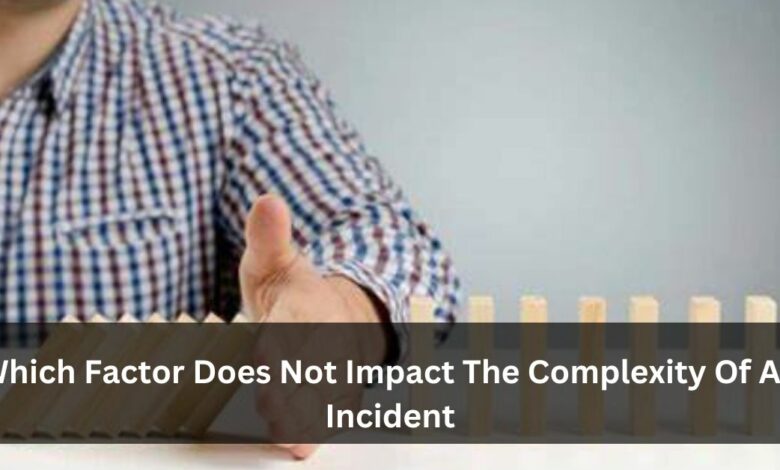Which Factor Does Not Impact The Complexity Of An Incident

In my relative’s personal experience, they found that the cost considerations of responding agencies did not significantly impact the complexity of the incident they faced.
Cost considerations of responding agencies” does not directly contribute to the complexity of an incident. Other factors like hazardous materials, political sensitivities, and community safety play more significant roles.
Allow me to elucidate the central theme which factor does not impact the complexity of an incident? Amidst the many considerations in incident management, one factor stands out as not directly impacting complexity.
What Is the Surprising Factor That Doesn’t Influence Incident Complexity – Click Here to Dive Deeper!
1. Challenging Conventional Wisdom:
Challenging Conventional Wisdom asks if what we usually believe about how money affects how hard it is to handle an emergency is true.
This heading sets up a discussion to see if there are other important factors we might be missing when it comes to dealing with difficult situations.
2. Exploring Nuanced Dynamics:

Understanding Many Parts looks at all the different aspects of managing a problem, not just money. This heading talks about how there’s a lot more to dealing with a situation than just thinking about how much it costs. It shows that there are many different things to consider when handling an emergency.
3. Understanding True Complexity Factors:
Discovering Real Complications helps us find out all the different things that make dealing with emergencies hard.
This heading talks about figuring out what makes problems complex, not just what we might think at first. It shows that there are many different reasons why emergencies can be difficult to handle.
4. Offering Valuable Insights:
Giving Useful Tips offers helpful advice to make dealing with emergencies easier. This heading talks about sharing practical ideas to improve how we handle tough situations and make decisions. It shows that there are ways to get better at responding to emergencies and making smart choices.
5. Encouraging Critical Reassessment
“Urging a Fresh Look” encourages people to rethink what they know about why emergencies are complicated.
This heading suggests that it’s important to think differently about what makes problems hard to solve. It shows that by looking at things in a new way, we might understand emergencies better and find better solutions.
Why Are Emergencies Complicated – Let’s Know The Secrets Behind Emergencies!
Ever thought about why some emergencies seem hard to handle, even if there’s enough money? It’s because there are lots of things besides money that make emergencies complicated. Understanding this helps us figure out better ways to deal with tough situations.
When we look closely at how emergencies work, we find out that while having money is important, it’s not the only thing that makes things hard.
For example, the type of emergency and how people respond to it can make a big difference. Whether it’s a flood, a power outage, or something else, each situation brings its challenges.
Also, having the right people and resources available when needed is crucial. So, instead of just thinking about money, it’s important to consider all these different things to handle emergencies better.
Why Are Emergencies Tricky, And What Doesn’t Matter Like We Thought

Have you ever thought about why emergencies can feel so confusing and difficult to handle? It’s because many things make them complicated.
But here’s the thing: it’s not always because of money. Even if there’s lots of money available, emergencies can still be hard to deal with.
When we look closely at what makes emergencies tough, we see that it’s not just about money. Things like the type of emergency, how people react, and what resources are available all play a role.
So, having lots of money might not always make things easier. It’s more about being ready and knowing what to do when something goes wrong.
So, next time you’re in an emergency, remember it’s not just about money – it’s about being prepared and knowing how to handle the situation.
What Does It Mean When We Say a Factor Doesn’t Impact The Complexity Of An Incident?
When we talk about a factor not impacting the complexity of an incident, it means that this specific thing doesn’t make the situation much harder to deal with. In simpler terms, it’s like saying that this particular factor doesn’t add much to the problem.
Understanding which factor does not impact the complexity of an incident is crucial for effective emergency management.
For instance, when considering the cost of responding to an incident, recognizing its minimal influence on complexity allows responders to allocate resources efficiently.
This awareness ensures a focused approach, prioritizing efforts where they matter most, ultimately enhancing the ability to manage emergencies effectively.
It’s like saying, “Hey, the cost might be important for other reasons, but when it comes to how tough it is to deal with the situation, it’s not the main thing we need to worry about.”
FAQs:
1. Can You Give Examples Of Factors That Don’t Impact Incident Complexity?
When considering which factor does not impact the complexity of an incident, examples such as the cost considerations of responding agencies or the geographic location of the incident come to mind. These are factors that may not directly affect the overall complexity of managing the incident.
2. Why Is It Important To Understand Which Factors Don’t Impact Incident Complexity?
Understanding which factors don’t impact incident complexity helps us focus our attention on the aspects that truly matter in managing emergencies. It allows us to allocate resources and plan response efforts more effectively.
3. Are There Factors That Can Increase Incident Complexity?
Yes, several factors can contribute to incident complexity, such as the type and scale of the incident, the level of community involvement, resource availability, and communication challenges among responders.
4. How Can We Improve Our Understanding Of Incident Complexity?
Improving our understanding of incident complexity involves analyzing past incidents, conducting thorough risk assessments, and engaging in continuous training and preparedness efforts. Additionally, collaborating with other agencies and sharing best practices can enhance our ability to manage complex emergencies effectively.
Conclusion:
What doesn’t make emergencies harder is the importance of managing them well. By knowing which factor does not affect the complexity of an incident, responders can use their resources better and focus on what’s most important. This helps make emergency management and response efforts more effective.
Read:


